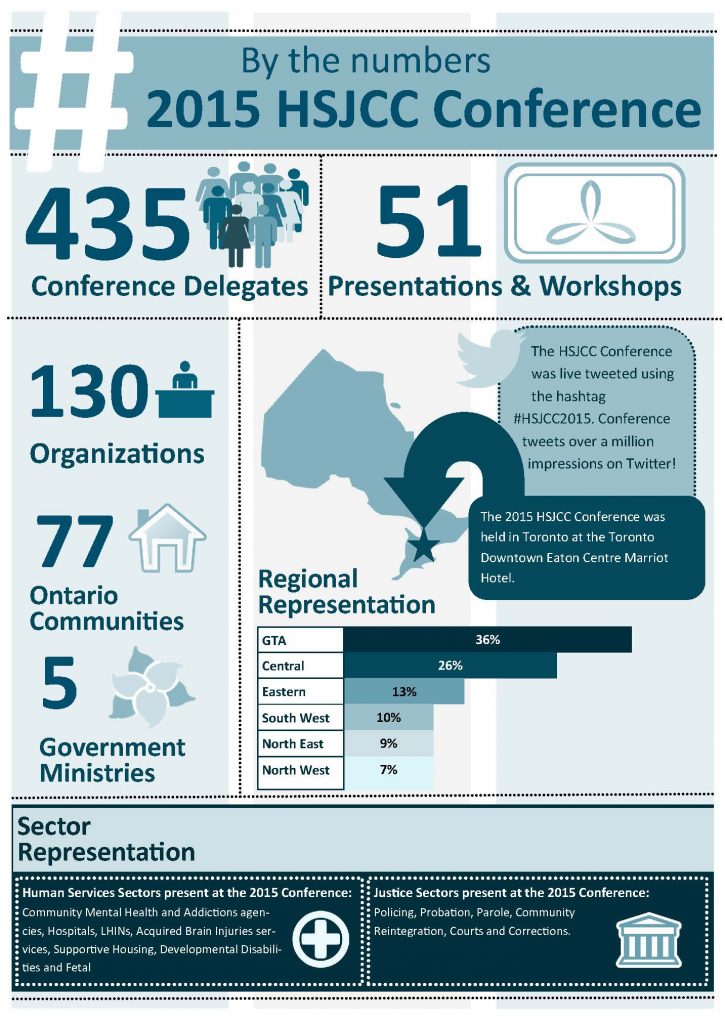
A Family Experience of Youth Justice – Redesigning Responsive Approaches with New Guides and a New Forensic Model for Youth Justice – 2015-11-17
This panel discussion will frame challenges and provide solutions to issues faced by mental health addictions, and justice sectors in addressing the needs, and enabling the strengths of young people under 18-years-of-age and their families. Through discussion of a family’s experience, and
Building a Service Resolution Function in Toronto – Recommendations for Meeting the Needs of People with Complex Mental Health & Justice Challenges – 2015-11-18
We will present findings from our recent research conducted for the T-HSJCC, from which we developed the characteristics of distinctive models of service resolution tailored for the Toronto context, for people with complex mental health and addictions needs involved (or at
Building Integrated Youth Forensic Services – The Journey – 2015-11-17
The Youth Forensic Service is a new provincial ministry initiative, intended to provide alternate care pathways for youth with mental health disorders who find themselves in conflict with the law. By way of forensic assessments, our service’s primary goal is to
Creating a Collaborative Approach to Seniors Issues in Rural Communities – 2015-11-18
Many communities are seeing an increase in senior related calls for service. This is true for police, hospitals, community health care providers and families. The issues surrounding seniors are multifaceted. In Durham region, we have recognized that a community partnership approach is
Developmental Disabilities Awareness in the Justice System Project – 2015-11-16
In its Knowledge Gap Analysis of Individuals with a Developmental Disability and Interactions with the Law, the Inter-ministerial Mental Health & Justice Committee identified a need to build capacity and share knowledge within the justice sector about people with developmental disabilities. This presentation
Discharge from Court Protocol – Why the Need and What Was the Gap in Services – 2015-11-16
The Red Bag Program, now called the Discharge from Court Protocol, was signed in 2010 as a Pilot Project for OCDC with Champlain East and with Renfrew County. These sealed, red envelopes are used to facilitate the transfer of special needs offenders’
Factors Influencing Mental Health and Criminal Justice Involvement – Bridging the Gap Between Two Sectors by Addressing the Social Determinants of Health
Five social determinants of health (income and employment; housing; education; discrimination; and social inclusion) and how they impact mental health and criminal justice involvement will be outlined. Promising practices and an expert panel discussion on future opportunities for system change and next
FASD and a Parent’s Perspective of Raising Children Affected by FASD and Access to Services – 2015-11-18
Challenges of accessing appropriate and sustainable supports and services for adults at the higher end of the FASD, i.e. ARND (Alcohol Neurological Disability) and how this sets the stage for involvement with the criminal justice system, homelessness and other poor social outcomes.
FASD and the Criminal Justice System – A Poor Fit – 2015-11-17
People with Fetal Alcohol Spectrum Disorder are over-represented in the justice system. This session will describe the disability and emerging effective approaches which include collaboration across systems. An overview of activities in Ontario will be shared along with current provincial and federal
Hamilton Acquired Brain Injury-Corrections Working Group – Integrating Multiple Sectors for Better Complex Case Management – 2015-11-18
This presentation will describe the development of the Hamilton Acquired Brain Injury (ABI) – Corrections Working Group which addresses the concerns of adults suspected of having an ABI, are at high risk in the community and have frequent contact with the criminal
Innovations in Mental Health Diversion – Life Skills Groups for Mental Health and Justice Clients – 2015-11-18
This workshop will introduce a new Life Skills Group offered by the Fred Victor Mental Health Court Support Program, created in collaboration with the Ministry of Community Safety and Correctional Services. The rationale for this innovation in Mental Health Diversion programming will
Meeting the Needs of Aboriginal Women in Ontario Corrections Through Programs and Services – 2015-11-17
This presentation will provide an overview of the programming and service strategies Ontario is using to address the needs of Aboriginal women who find themselves involved in correctional services; also how these programs and services can assist Aboriginal women in successful reintegration
Mental Health Courts – Finding Institutional Resilience and Promoting Justice – Keynote – Heather Perkins-McVey – 2015-11
Specialized Courts have been a fixture of the criminal justice system for almost 20 years. In the same way that personal resilience is important to one’s well being so is institutional resilience to ensure that a program is responsive to changing circumstances
Mental Health Diversion Program – 2015-11-17
People living with mental health symptoms or diagnosis, or a developmental disability may access alternatives to criminal prosecution. This process is known as a mental health diversion. If the Crown Attorney believes the symptoms of mental health are related to the
Mobile Crisis Intervention Team (MCIT) – Development and Evaluation of Toronto’s Co-Responding Police Mental Health Service Team – 2015-11-17
The Mobile Crisis Intervention Team (MCIT) is a co-responding police-mental health program. This presentation will share the process of coordinating MCIT’s across hospital, LHIN, and justice/healthcare boundaries. The results of a mixed-method outcome evaluation will be presented, focusing on clients’ experiences with
Navigating the Criminal Justice and Mental Health Systems – 2015-11-17
The mental health and criminal justice systems map – which aims to assist individuals who have come into contact with the law, their friends and family, and service providers, in navigating the two systems – will be outlined. Local and Regional
One Patient, One Plan – The Intersection of Risk & Recovery – 2015-11-16
There are a number of unanswered questions about how to best apply the principles and practices of patient partnered care and recovery in a forensic mental health setting and whether these are even achievable. This session will take you through the NBRHC
Opening the Doors of Justice – An Attempt to Make True Justice Accessible to People with an Intellectual Disability Who Have Been the Victims of a Crime – 2015-11-17
Mark Pathak pioneered a model of work to enable people with intellectual disabilities engage with the criminal justice system as complainants. The framework provides specialist support to help witnesses prepare for the courtroom experience while helping the court understand in advance the
Optimizing Collaboration between Hamilton Detention Centre & Mental Health Services Through the Use of CTO’s – 2015-11-17
In this session, we will discuss our experiences with community treatment orders (CTO’s), including the value and limitations of CTOs and barriers and challenges to using CTOs for mentally ill offenders. We will describe innovative justice-healthcare collaborations and the essential components that
Provincial Approach to Community Safety and Well-being – 2015-11-17
MCSCS has been working with its inter-ministerial, policing and community partners on the development of the Provincial Approach. This work support multi-sectoral, collaborative relationships between local organizations/agencies to enhance the effectiveness of service delivery and community safety and well-being overall. Provincial Approach to
Reintegration Centre Inception and Development – Mobilizing the Community – 2015-11-17
The Reintegration Centre locates various service providers under one roof to address the reintegration needs of releases. In this pioneering model, it is expected that enhanced service continuity for men immediately upon discharge will increase community safety, reduce likelihood of recidivism and
Safe Pathways – Supporting Dementia in the Justice System – 2015-11-17
In the Guelph Wellington community, a collaborative community approach was created to support and guide individuals with dementia and their care partners away from and/or through the Judicial System. Safe Pathways aims to reduce the likelihood that persons with dementia will enter
Sheldon Kennedy – Keynote Speaker – 2015-11-16
Sheldon Kennedy has skated for three teams in his eight year NHL career but is best known for his courageous decision to charge his Major Junior Hockey League Coach with sexual assault for the abuse he suffered over a five year
Specialized Crisis Team – Psychiatric Assistance at Police Incidents – 2016-11-16
The Waterloo Regional Police Service, Canadian Mental Health Association and the Local Health Integration Network (LHIN) have been involved in a partnership since February of 2013 to deliver enhanced mental health crisis services directly to those in need. Police officers attending mental health
System Improvement Through Service Collaboratives (SISC)
Implementing Cross-Sectoral Initiatives within the Justice System to support Children and Youth with Mental Health & Addiction Needs Learn how the Niagara, Champlain, and Kenora Rainy River Justice Collaboratives have used implementation science and a community-led process to support the exploration of system challenges,
Taking the Next Step – Designing Effective Treatment Supports for Community Reintegration of Forensic Patients – 2015-11-17
Taking the next step towards full community reintegration of forensic patients involves a qualitative departure from the structured hospital system. It must be done in a thoughtful and comprehensive way designed to address the individual risks unique to each forensic patient as
The Changing Landscape of Treatment in Forensic Psychiatry – 2015-11-16
As we face legislative changes, precedent-setting court decisions and institutional re-structuring, it behooves us to generate innovative solutions for consumers of forensic psychiatric services. Individuals never-before considered viable for community placement are now successfully treated and managed in community settings. Novel approaches
The Forensic Early Intervention Service – A New Pathway Initiative to Mental Health Care – 2015-11-18
The Centre for Addiction and Mental Health (CAMH) and Forensic Early Intervention Service (FEIS) is a new program housed in the Toronto South Detention Centre (TSDC). FEIS is a partnership between CAMH, the Ministry of Long Term Care (MOHLTC) and the Ministry
The GA Inquest on Youth Suicide – Lessons Learned – 2015-11-17
On May 13, 2008, GA, a 17 year old youth, committed suicide. At the time of his death, GA was in custody on a remand from the Ontario Court of Justice. He died the night before his sentence hearing. On October, 24,
The North Community Network of Specialized Care Skills Systems Group – An Adaptation Of DBT for People with Developmental Disabilities Delivered by Videoconference
The NCNSC Skills System Group provides this adaptation of DBT via videoconference to people across northern Ontario who have developmental disabilities *DD (and problems with emotion regulation). It is proving to be effective in helping people with DD reduce challenging behaviour while
Toronto Police Service Response to Emotionally Disturbed Persons – Keynote – Chris Boddy – 2015-11-16
Toronto Police Service Response to Emotionally Disturbed Persons – Keynote – Chris Boddy – 2015-11-16
Transforming Compassion Fatigue – 2015-11-16
Compassion Fatigue and vicarious trauma are natural consequences of the work carried out by those employed in law enforcement, mental health and the justice occupations. We can no longer afford to view the ‘burned out’ staff as an anomaly. We must take
Trauma and Violent Offending – Understanding Gang Violence Through the Lens of an Ex-Gang Member – 2015-11-17
The aim of this article is to examine how violent traumatic exposure over the life course can lead to future gang membership, violent offending and subsequent contact with the law. Drawing on a case study approach and a first person narrative our
Trauma, PTSD, and the Probation Client – Shifting Paradigms, Investigating the Need for a Trauma Informed Approach – 2015-11-16
Probation clients often have significant histories of trauma exposure, are at an increased risk of revictimization, further trauma exposure and developing other co-morbid mental health issues. Barriers to trauma disclosure and treatment will be examined as we sensitize practitioners in the criminal
Understanding the Implications of Undiagnosed Brain Injury in Childhood – 2015-11-17
When childhood brain injury is identified and treated a legacy of trauma, mental health and addiction challenges, contact with the justice system can be prevented and/or reduced in severity. Understanding the Implications of Undiagnosed Brain Injury in Childhood – 2015-11-17
What You Need to Ask Me – New Tools and Training to Enhance Mental Health Legal Advocacy – 2015-11-17
Legal advocates are professionally bound to operate on the basis of client instructions – but identifying those legal options is closely tied to understanding where a client is coming from and the issues in their life. Legal Aid Ontario and the Canadian


